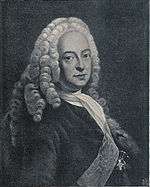Frederiksdal House
| Frederiksdal | |
|---|---|
.jpg) Frederiksdal | |
| General information | |
| Architectural style | Rococo |
| Location | Lyngby-Taarbæk, Copenhagen, Denmark |
| Country | Denmark |
| Coordinates | 55°46′57″N 12°27′3″E / 55.78250°N 12.45083°E |
| Construction started | 1744 |
| Completed | 1747 |
| Client | Johan Sigismund Schulin |
| Design and construction | |
| Architect | Niels Eigtved |
Frederiksdal is a country house on the Furesø Lake north of Copenhagen, Denmark.
History
Origins
Frederiksdal takes its name after King Frederick III who in 1668 acquired the land which had been the site of a copper mill, Hjortholm Mill, since 1650. The king had plans to build a large maison de plaisance in the grounds but died in 1780 and his son Christian V abandoned the project. Frederick IV ceded the estate to his sister, Princess Sophia Hedwig, and she began the construction of a house which for unknown reasons bore a striking resemblance with Ørholm Manor on the island of Funen, but it was never completed.[1]

The current house
The town of Bagsværd is disjoined from the Frederiksdal estate in 1735 and in 1839 Frederiksdal is put at the disposal of Johan Sigismund Schulin, a close friend of the royal family who had been ennobled and received a number of prominent appointments since Christian VI's ascend to the throne in 1730. On 30 December 1743, Schulin is granted the property from the king as a New Year present. He charged royal architect Niels Eigtved with the design of a summer risidence which was completed in 1747.[2]
Schulin was created Count in 1750 but died later that same year. His wife Catarine Marie Schlin (née von Møsting) carried out alterations on the house in 1752 and 1753 with the assistance of the architect Johann Gottfried Rosenberg. The property has remained in the Schulin family to the present day.[2]
Architecture

Frederiksdal is credited with being the earliest example of a maison de plaisance in Denmark. It stands in white-dressed masonry with sandstone decorations above the windows and two corner risalits on the main facade. The house originally had a hipped roof while the mansard roof is the result of alterations carried out by Johann Gottfried Rosenberg between 1752 and 1753.
The interior features a combination of large and small rooms symmetrically arranged around the main axis' vestibule and conservatory. There are rich Rococo-style stucco decorations, particularly in the Garden Hall, executed by Carlo Enrico Brenno and Giovanni-Battista Fossati.
Frederiksdal today
The property is currently owned by the seventh generation of the Schulin family. The main building plays host to an annual series of classical concerts.
The estate covers 328 hectares of land of which circa 200 hectares are forest.
References
- ↑ "Frederiksdal" (in Danish). Gyldendal. Retrieved 2012-06-05.
- 1 2 "Frederiksdal" (in Danish). Kulturstyrelsen. Retrieved 2012-06-08.
External links
| Wikimedia Commons has media related to Frederiksdal. |
Coordinates: 55°46′57″N 12°27′3″E / 55.78250°N 12.45083°E
| ||||||||||||||||||||||||||